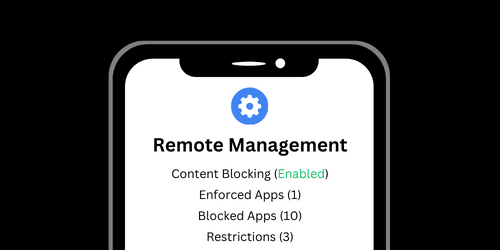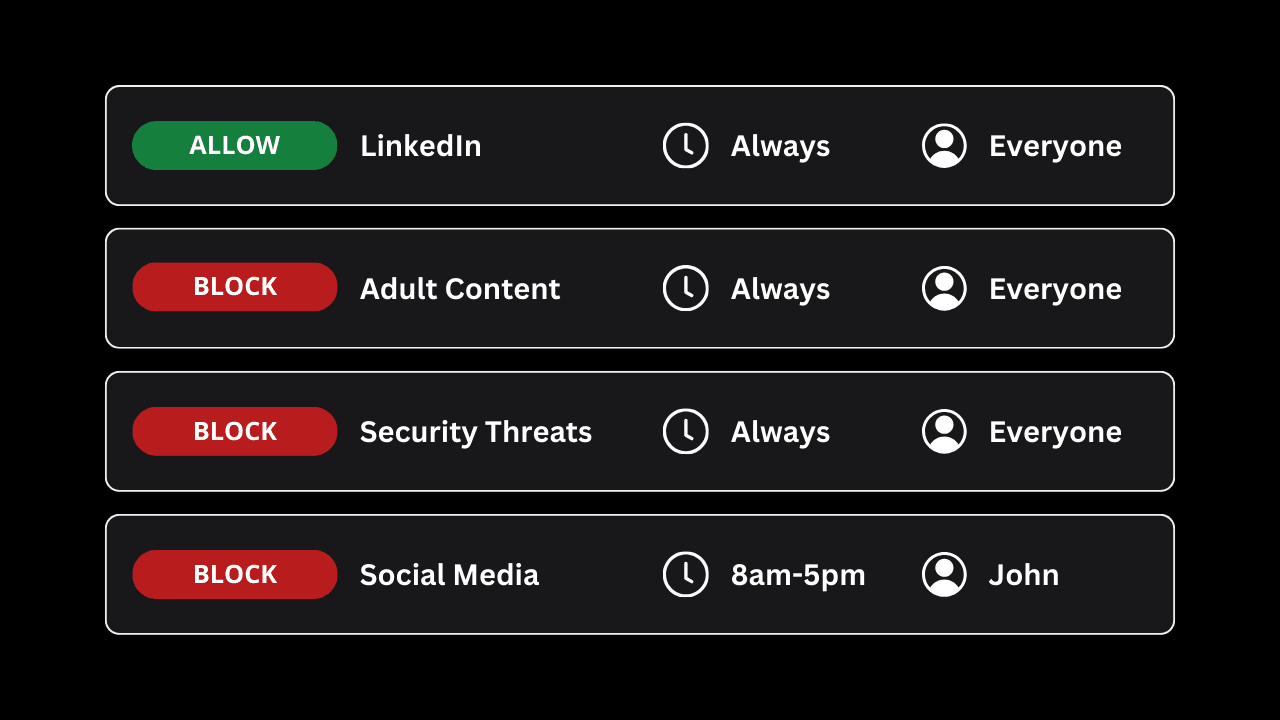Blocking VPNs on Android
How to Block VPNs on Android smartphones
Effective ways to completely block VPNs on Android devices using methods that work for adults as well as kids.
If you're trying to ensure that content filtering can't be bypassed on an Android smartphone, you may have considered how VPNs can be blocked or restricted completely.
VPNs can be especially important to block if you're managing your own restrictions as an adult, since you often have to consider multiple techniques at once to complete your full blocking system. We call this the multi-layered approach, and while it works for adults, it's also recommended if you're managing a device for someone else, like a child.
Restrict VPN Apps and Play Store Features
There is no shortage of parental control apps that could be installed from the Play Store, but there are more techniques you can consider if you need to completely block apps on Android smartphones.
If you're an adult managing your own smartphone, we strongly recommend using the rest of the advice in our guide, since we've specifically curated these techniques for self-management.
Restrict Play Store Downloads with Parental Controls
Most parental control apps allow you to prevent your child's smartphone from installing any new app from the Play Store without permission. Some parental control apps will even notify you as the parent if your child requests to download an app.
However, you can also set up parental controls that limit apps rated below a certain age rating directly from the Play Store.
An even better option would be to use Google Family to manage Google Play, but you may also consider a few of our recommendations for parental control apps from our blog post on alternatives to Google Family .
Block the Settings App with an App Blocker
There are several app blockers that are available on the Play Store, and many of them can be used to block the Setting app directly.
This can be useful if you need to ensure VPNs can't be manually added (or modified) from the Settings app. That being said, I'd recommend reading the rest of this guide for additional techniques that you could combine with an App Blocker or replace it entirely, since there tend to be compatibility issues with most apps.
Block Google Play
You could also consider disabling Google Play entirely to avoid new app installs.
This prevents most VPNs from being downloaded from the Play Store, although you might want to consider additional techniques to restrict developer mode if you need more advanced restrictions.
Block VPN Apps and Control Settings with Device Management
The most effective way to completely restrict VPN apps if you're an adult enforcing restrictions on your own Android smartphone is by enabling managed mode.
Managed mode enabled more in-depth controls than you could typically use with App Blockers or parental controls, since it has direct access to the operating system of the smartphone itself. It's able to directly control the Play Store, prevent apps from being deleted from your smartphone, manage settings, and more.
As someone who's spent hundreds of hours researching the best ways to block content on different devices, managed mode is the most comprehensive way to control an Android smartphone. It's my most recommended approach, whether you're an adult enforcing restrictions on your own technology or a parent trying to enable more restrictions for their child.
Prerequisites for Enabling Managed Mode
Managed mode is very comprehensive, and as a result, I'd recommend ensuring you're prepared:
- Managed mode requires a full device reset, so it's important to ensure critical data is backed up correctly.
- You should use a second device (ideally a laptop or desktop computer) to help with the management process.
I've created a full guide for enabling device management on Android smartphones that fully walks you through the process from start to finish. This guide also covers two potential routes you could consider for your own device and is available as part of a Tech Lockdown membership.
Directly Block Specific VPN Apps from the Play Store
Managed mode includes an option to whitelist apps available on your device without needing to use Google Play at all. This ensures no VPN apps (or other, unapproved apps) can be installed on your device.
Prevent New Apps from Being Downloaded from the Play Store
Automatically prevent any new or unknown app from being installed without outside help.
Restrict Access to the Settings App Completely
Managed mode can completely hide the Settings app on your smartphone entirely, meaning that new VPN profiles can't be added or modified.
You can do this by enabling kiosk mode, and de-select the Settings app from you allowed list of apps:
Manage Advanced Restrictions with Full Management
Managed mode also enables you to control other features, including ones that aren't possible with a standard App Blocker. This includes options like:
- Preventing a factory reset, safe mode, or developer mode.
- Manage allowed Wi-Fi networks.
- Disable or block default apps that can't be uninstalled.

Disable VPN Services with a DNS Content Policy
One of the most effective ways to block VPNs on an Android smartphone is to filter the VPN services on your smartphone's internet connection. This will work on both VPN apps downloaded from the Play Store and most kinds of VPN profiles adding using the Settings app.
Different services can be blocked on your smartphone, and this tricks a VPN into thinking your device isn't connected to the internet and prevents it from connecting. Generally, you do this by blocking a specific category of websites, apps, or services instead of finding the exact settings to configure yourself.
The most effective approach for doing this reliably on Android smartphones is to use a DNS Content Policy to block.
Block Categories used by VPN apps and websites
Most DNS filtering or Content Policy platforms include a content category (or multiple categories) that you can block to prevent VPN services from working.
For example, with Tech Lockdown's DNS Content Policy, you would create a block rule that blocks these categories:
- Anonymizer: A category that generally describes VPN, proxy, or other bypass technique services, websites, and apps.
- CIPA Filter: A filter commonly used by schools or universities to block all kinds of unwanted content, including VPNs, proxies, explicit content, and similar kinds of content.
Examine Traffic Logs and Block Domains Directly
You can also view recent DNS requests on your Content Policy and add the associated domains to a block list.
This is extremely helpful if you're having trouble blocking a specific VPN app and need to ensure that it's disabled completely. Tech Lockdown's traffic logs include additional information for each request, such as the full hostname, the number of times the domain was accessed in a timeframe, and whether the request was blocked or allowed on your Content Policy.
Block keywords in website domains
In some cases, you might also want to block specific keywords that might appear in the domain of a website or be included with a service. You can use keyword blocking on your Content Policy to automatically match domains like this and block them.
I'd recommend choosing words with at least 4 or more letters, since there is a chance that other websites could get blocked unintentionally.

Consider Additional Blocking Techniques
Blocking VPNs is just one part of developing your own blocking system. If you're serious about restricting your own technology and managing your internet access, I have several guides that are popular with Android users.
Enable "Dumb Phone" Restrictions on your Android for a Minimalist Feel
The term dumb phone usually refers to an older flip phone that doesn't have any of the typical smart features of modern smartphones. However, in our day and age, it isn't always possible to completely ditch your smartphone, so I've written a comprehensive guide to creating a dumb Android smartphone .
Block Websites on Android Smartphones
Websites can be tricky if you're only relying on techniques you find through a Google search or with ChatGPT, so I've explained several options in our comprehensive guide to blocking websites on Android smartphones.
Block Apps on an Android Smartphone
VPN apps are just one type of app you might need to block to prevent access to explicit content. I cover additional techniques in our guide to blocking apps on Android, and I've also written multiple guides covering specific techniques for the most common apps.